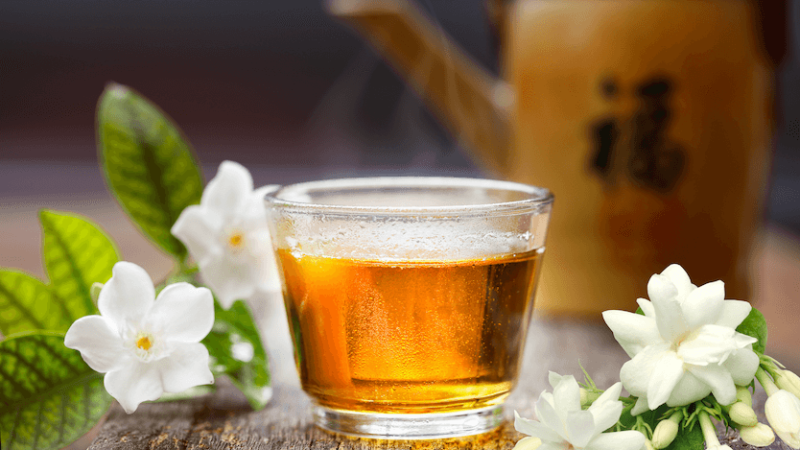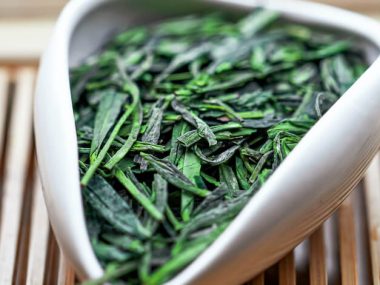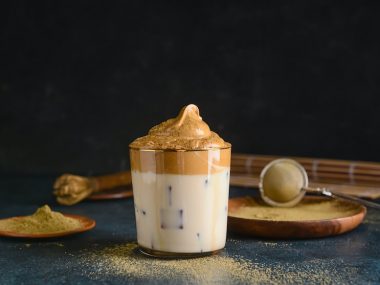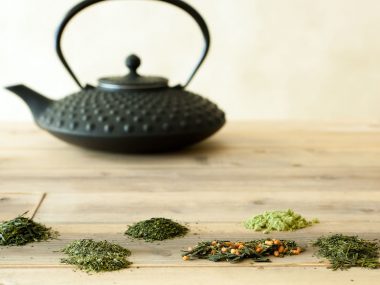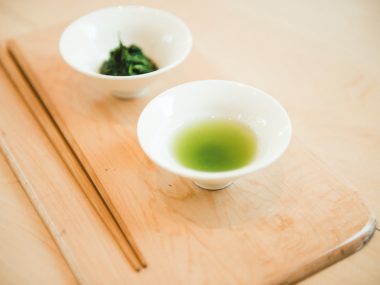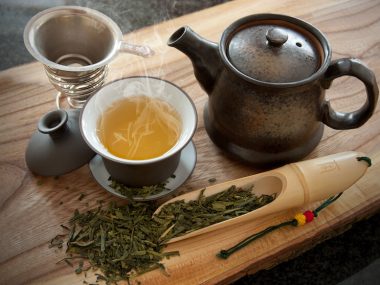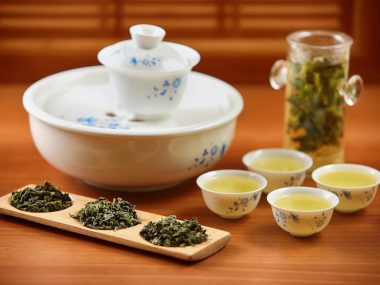Some teas are so fragrant you can lose yourself in their aromas. We have a tea for you that has an almost immediate dual effect with the power to change you psychologically and physically. All it takes to love jasmine tea is one sniff.
Table of Contents
What Is Jasmine Tea?
Jasmine tea is well known for its beautiful floral bouquet that wafts through the air. Your senses are bombarded as you sip a cup of this tea. The clear tea comes through with a potent floral flavor. Both the aroma and flavor are from the Jasmine flowers, which are infused into tea leaves.
The Jasminum officinale plant (the Jasmine flower) is said to have origins in Persia. However, the exact origin is unknown. What is certain is that sometime during the Song Dynasty (927-1279,) the Chinese began growing this plant and brewing tea from it. Today, Jasmine tea accounts for 70% of the teas produced in China.
How Is Jasmine Tea Processed?
Cultivating, harvesting, and processing Jasmine tea is a tradition many tea growers embrace as a sacred skill to have. The traditional method to process the tea takes up to six months, and just like fine wine, time cannot be rushed. Otherwise, the tea will not be honorably worthy of drinking.
The plant’s leaves are harvested in early spring, and the flower buds are picked from June to August. The tea leaves come from a tea plant. The Jasmine flowers come from the Jasminum officinale plant. It’s the marriage of the two during the infusing process that creates Jasmine tea.
Leaves
The leaves are handpicked and brought back to where they undergo rigorous sifting and separation. Then the tea leaves are placed onto what looks like round bamboo trays that are several feet wide. A tea worker takes the tray and lifts the leaves up into the air, which separates the smaller leaves from the large ones.
After a series of sifts, the leaves are placed in bags that someone kicks. This is called “shaping,” which separates the heavy leaves from the lighter ones. The best leaves are handpicked and then taken to be baked.
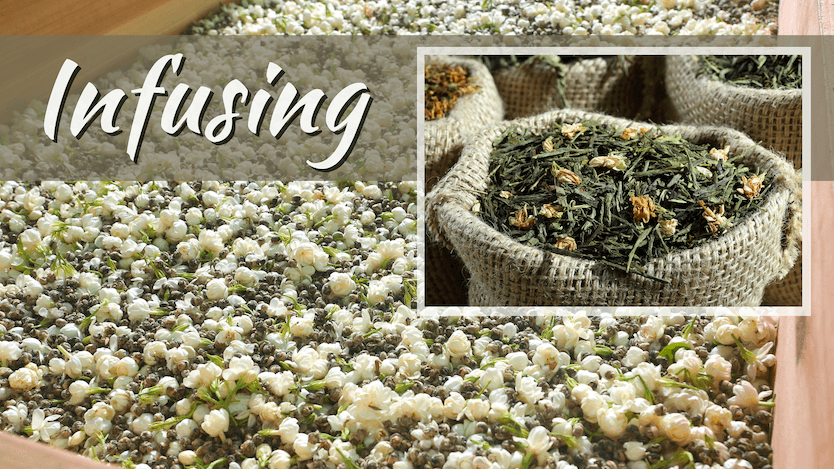
Flower Buds
The flower buds are picked by hand when they are about to bloom. This is done in the afternoon. The buds are taken to a storage room, where they are spread out on a floor. Jasmine flowers only bloom at night for a very short few hours. Because of this, the tea growers go into the storage room during their blooming time and gather them up where they are taken to be mixed in with the baked leaves.
Infusing
The process of adding the baked tea leaves and the flowers is what’s known as “infusing.” Over the next six months, the leaves and flowers continue to undergo additional “infusions” where more flowers are added. This is what gives jasmine tea its profuse floral aroma and flavor.
The leaves and flowers are allowed to rest once mixed together for a period of 12 hours before the next infusing occurs. Premium Jasmine teas will have undergone at least nine infusions. Lower quality tea will not be as aromatic and flavorful because they have had fewer infusing sessions.
The Finished Product
Jasmine tea that has gone through traditional processing typically comes as loose green tea.
However, some growers are taking things a few steps further by wrapping tea leaves with blossoms creating pearls. Buying your tea from a reputable company is important because there are “versions” of Jasmine tea on the market that are not true Jasmine tea.
Some Jasmine teas come under the disguise of tea leaf blends of black, oolong, and white artificially flavored. So “buyer beware” when shopping for the real deal.
Tip: To get the best Jasmine tea, look for one, grown in the Fujian Province of China.
Does Jasmine Tea Have Caffeine?
Jasmine tea does have caffeine. Researchers indicate that the longer you brew jasmine tea, the higher the caffeine count will be. There’s no exact caffeine count because brewing varies. The average cup of Jasmine green tea yields between 30-50 mg of caffeine.
However, one person may use more tea than someone else. Additionally, brewing times differ.
An estimation in green-tea-based brewing yielded some insight into what the possible caffeine intake would be.
½ tsp. of green loose leaf tea:
- Brewed 1 minute = about 28 mg of caffeine
- Brewed 3 minutes = about 33 mg of caffeine
- Brewed 5 minutes = about 35 mg of caffeine
What is Jasmine Tea Good For?
Aside from the health benefits that Jasmine tea provides, having tea with such a potent fragrance is one of the reasons we come to love and enjoy it. When you sit down to have a cup of jasmine tea, it’s impossible not to feel uplifted! It’s like having a cup of sunshine on a dark day just when you need it.
Can I Drink Jasmine Tea Every Day?
According to the FDA, an eight-ounce cup of tea has about 30-50 mg of caffeine. The recommended daily intake is 400 mg. With this in mind, you can safely enjoy 1-2 cups of Jasmine tea a day. You will most likely be fully aware if you’ve indulged a little too much because of caffeine jitters.
Jasmine Tea Benefits
Jasmine tea has numerous benefits that include heart health, anti-inflammatory, and weight loss. In addition to the above, this tea also:
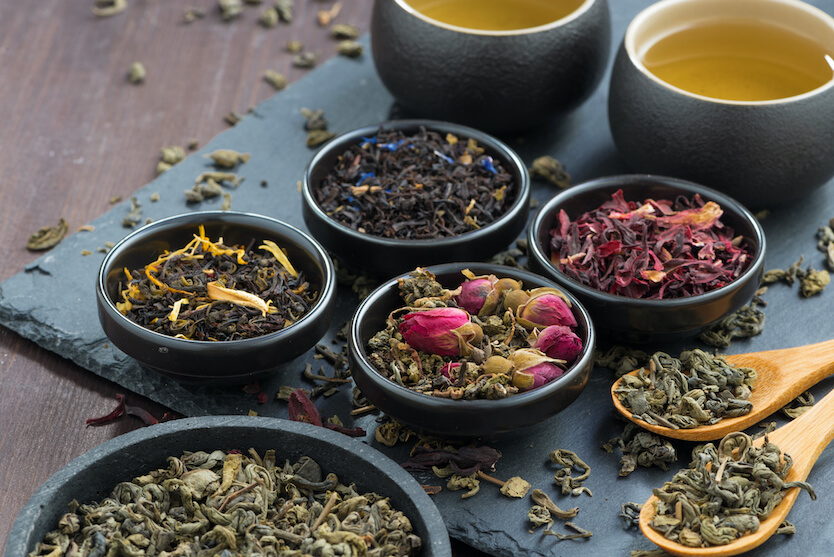
Relaxes and Calms
Studies indicate that linalool (a compound found in the Jasminum officinale plant) is responsible for the lovely aroma the Jasmine flower emits. When inhaling the aroma, our heart rate decreases, and an overall sense of calm is experienced. The aroma is reported to have a sedating effect. Essential oils containing natural Jasmine and Jasmine tea both have highly beneficial calming effects. What we perceive to be a wonderful floral scent is, in fact, linalools that have the power to calm once they enter our nose.
Has Antibacterial Properties
Research done on how effective Jasmine is in warding off certain strains of bacteria shows that it does have antibacterial benefits. The natural oil of Jasmine was put to the test against E. coli and compared against penicillin and ampicillin. Jasmine had the power to affect the cell walls of the bacteria where the antibiotics could not. Drinking Jasmine tea may help us to naturally fight bacterial infections, which is a BIG plus!
Acts as an Antidepressant
Jasmine tea has the ability to stimulate our nervous system. A study done on Jasmine’s effects on brain waves indicates that it encourages positive emotions and an overall feeling of contentment while decreasing negative emotions. Having a cup of Jasmine tea definitely helps us to feel better and goes to show us that in the middle of a bad day, a cup of this tea brightens things up, making us feel better.
Is Jasmine Tea Good For Skin?
As an essential oil, Jasmine has been found to have numerous benefits. Researchers discovered that Jasmine had valuable benefits dermatologically for skin conditions. Because of its antibacterial properties, Jasmine proved to be a foe against acne. It also helps to improve dry/aged complexions. Skin inflammations also benefited from Jasmine, as does psoriasis. Beauty products containing unadulterated Jasmine oil are a bonus if you have skin conditions.
Is Jasmine Tea Good For Anxiety?
Jasmine has several attributes when it comes to putting anxiety in its place! It has the ability to decrease our heart rate. Heart rate plays a big role in anxiety because the two are interchangeable. One causes the other. By just taking in the aroma of Jasmine, your central nervous system goes into a calmer state which helps to relieve anxiety. Whether you reach for Jasmine essential oil or a cup of tea, both will have a beneficial effect.
How To Make Jasmine Tea
To make a cuppa, here all the things you’ll need:
- Jasmine tea (loose is best)
- Tea strainer
- Teapot or teacup with cover
- Kettle (electric is best so you can control the heat setting)
- Fill your kettle with filtered water and heat until it reaches 160-180 degrees (F.)
Instructions
- Tap water will cause your tea to be bitter because of the chlorine. It’s best to use bottled (not distilled) water.
- Avoid boiling water because it cooks the tea rather than brews it.
- Place your loose Jasmine tea in a tea strainer.
- Prewarm your teapot or teacup to avoid temperature loss of your tea. This is done by bathing the inside of your teapot/teacup with hot water.
- Pour the hot water into the teapot or teacup.
- Cover and allow to steep for 2-4 minutes.
What Is The Best Time To Drink Jasmine Tea?
Jasmine tea can upset an empty stomach, so it’s best to enjoy this tea after you’ve eaten. Green teas are acidic, which can irritate the lining of an empty stomach. Also, it’s best not to have Jasmine tea after 6:00 pm because caffeine can interfere with sleep.
A Tea Well Worth Enjoying
The beauty of flowers fills every crevice of our sense of smell and taste. There’s no denying that Jasmine tea brings so much more to a simple cup of tea with its aromatic bouquet and floral taste. There’s something to be said about the profound effect tea has as it elevates us to a moment of complete and utter enjoyment.
